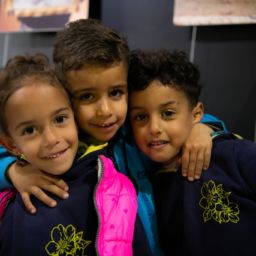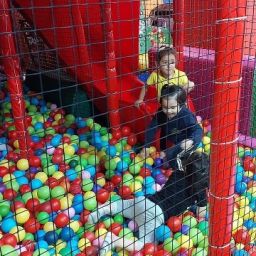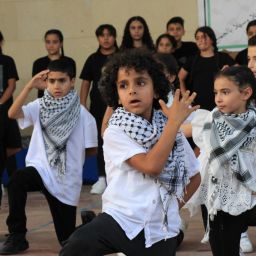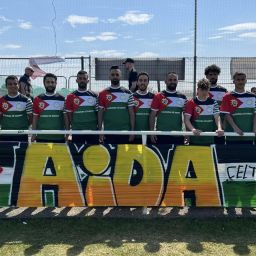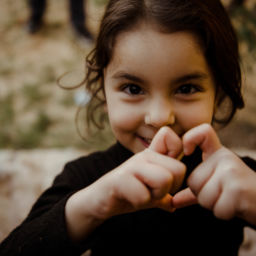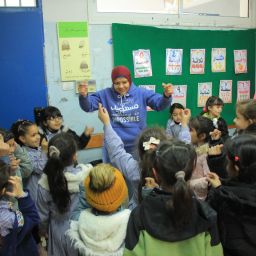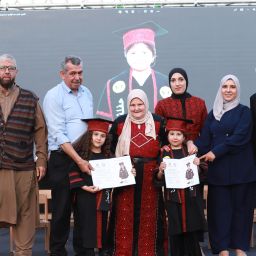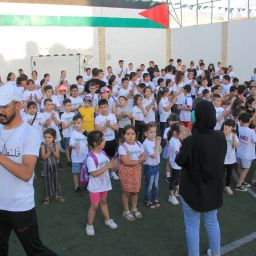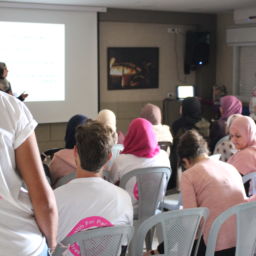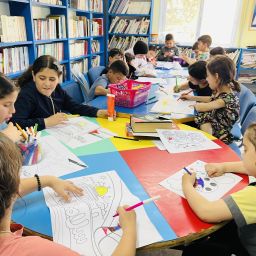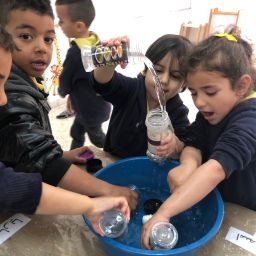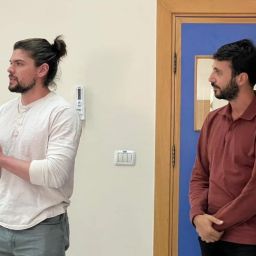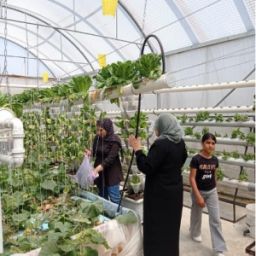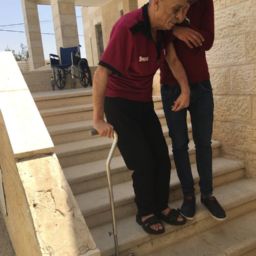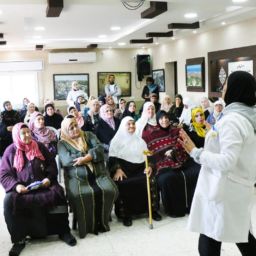For many years, we referred to November as the black month, but in Palestine, every day is marked by darkness and the shedding of our blood. Our spring is the Jenin massacre, and our autumn is the Gaza massacre.
This month in Palestine mirrors the struggles of the past 75 years for Palestinians. Since October 7th, the colonial apartheid army has relentlessly sought to punish Palestinians through martyrdom, arrests, oppression, blockade, and displacement.
For 54 days, the world has witnessed a genocidal war, ethnic cleansing, and a repression policy by the colonial apartheid regime against Palestinians. Despite international condemnation, governments have shown more words than actions to halt the genocidal war in Gaza or the attacks in the West Bank.
In Gaza, over 20,000 people have been martyred, with 70% being children and women. More than 50,000 are injured, facing shortages of medical supplies due to the colonial apartheid regime’s restrictions. Additionally, 1.8 million Palestinians in Gaza are displaced, living in shelters with no water, electricity, or food. The colonial apartheid regime continues its attacks, targeting even areas designated as safe.
The situation in the West Bank and the 48 lands mirrors Gaza, with over 200 martyrs since October 7th and 400 since the beginning of the year. Nightly arrests and detainment of Palestinians without charges are rampant. The colonial apartheid regime has arrested over 3,500 Palestinians, subjecting them to harsh conditions, limited clothing, inadequate meals, and restricted water.
Seven Palestinian prisoners have been martyred in prisons due to oppressive policies. Sick Palestinian prisoners are exploited as a means of punishment by withholding treatment, causing agony for those inside the prisons. More than ten Palestinian prisoners suffer in pain, prevented from receiving the necessary help.
During this month, Lajee bid farewell to our friend and a community health worker in Balata camp, Nablus, Rasmi Arafat. On October 30th, we received news that Rasmi had been shot during an attack by the colonial army on Askar camp in Nalus. Hours later, we learned of Rasmi’s death.
Tragically, the bloodshed continued. Aida camp mourned the loss of Mohammad Azieh, a 17-year-old who actively participated in our summer activities. While studying in his room, a sniper fatally shot him in the heart. The cruelty persisted as the ambulance was denied entry to the camp, leaving Mohammad bleeding on the street for over 30 minutes. His father, attempting to rush him to the hospital in a civilian car, faced brutality from the colonial army. After twenty minutes, Mohammad’s clothes were handed to his father, along with the chilling words, “If your son lived, we will allow you to visit him in Hadassah Hospital.” Hours later, Mohammad’s death was announced, and his body was returned to his family on a truck.
In the midst of these challenging circumstances in Palestine, we’ve had to suspend many activities and adjust strategies when working with children and youth. Our current focus is on increasing awareness among the next generations about their rights, particularly the right of return and the right of self-determination. We engage in activities to introduce children to Palestine as a whole land, establish connections to their homeland, and provide them with a space to express their emotions through self-regulation and movement activities.
For children aged 4-5, we’ve focused on building the concept of boycott through puppet plays. For 6-8 year-olds, activities involve drawing the Palestinian flag and playing games that allow them to express their feelings about the situation. The 8-10 age group engages in weekly sessions, expressing emotions through games and drawings of the Palestinian map to connect them to the entirety of Palestine.
For 10-12 year-olds, we’ve held three meetings to build trust, encouraging them to express their feelings and providing space for their preferences. Additionally, we’ve introduced them to their home villages through videos containing images from 1948 and before, along with information about their ancestral lands.
Lajee Celtic
The Green Brigade has long been recognized for supporting Palestinian rights of resistance, self-determination, and the right of return. On October 25th, during the European football champions match between Celtic and Atletico Madrid, the Green Brigade displayed over 15,000 Palestinian flags. This action sparked conflict with the Celtic team administration, leading to restrictions on many Green Brigade members attending games and terminations. Fines were also imposed for displaying the Palestinian flag during the game.
Despite the repercussions, reports from people, including children and youths playing with the Lajee Celtic team, indicate that seeing the Palestinian flag in the European football championship games provides them with significant support and encouragement. They feel they are on the right side, particularly in these times when the international community appears to support the genocidal war against Palestinians in Gaza and across Palestine.
Since October 7th, training within the Lajee Celtic academy has been paused due to attacks on the Lajee garden and football field with tear gas bombs, causing damage to the football field grass.
ACLAI Palestine Gym
Regular training continued for women and men, with 252 visits during this month. However, boxing training for boys and youths had to be temporarily halted due to the situation. The boxing coach faced challenges in reaching Bethlehem because of checkpoints and the blockade imposed by the colonial apartheid regime in the West Bank.
Health Unit
This month, community health workers conducted 141 visits to various patients suffering from chronic diseases (such as hypertension and diabetes), totalling 117 patients from the Aida and Al-Azza camps.
During these home visits, health workers examine blood pressure and blood sugar, ensuring the correct and timely intake of medications according to the plan developed in collaboration with Dr. Mohammed and Dr. Henry. They consistently follow up, actively listen, and extend the visit duration, often reaching an hour or more, especially in these challenging conditions that have impacted patients psychologically, emotionally, socially, and economically. Additionally, there were emergency visits by health workers throughout the month, continuing to visit patients with previous health issues, adjusting their medications, and establishing personalised programs.
The community health workers conduct two visits per patient per month, focusing on controlling their condition by providing necessary medications, adjusting dietary plans, and encouraging physical activity. However, given the challenging events in Palestine and specifically in Gaza this month, an emergency plan was implemented for essential visits. This includes visiting patients at level 3 three times a month and those at level 1 or 2 twice a month, offering psychological support alongside health monitoring.
The community health workers initiated an action plan to advocate with the UNRWA in collaboration with Master’s students in Social Work at Bethlehem University. A meeting with the Director of Relief Services and Social Services, Professor Raed Omaira, involved discussing several questions regarding the agency’s policies, the services provided to refugees, the cutbacks imposed by UNRWA on refugee rights, and proposing the idea of an emergency room.
Environmental Unit
The work of the environmental unit staff for this month included:
- Harvesting flowers, red cabbage, lettuce, onions, mint, and tomatoes from the plastic house and distributing them to a number of patients.
- Daily monitoring of water levels, acidity, and ensuring an adequate supply of nutrients for each water system.
- Watering flowers and agricultural crops.
- Cultivating hydroponic systems in plastic houses with various crops such as green and red mustard, kale, and chard in the new plastic house.
- Addressing and modifying some errors in the hydroponic systems.
- Disassembling tower systems, cleaning the towers’ containers from dirt and algae, and repairing them.
- Monitoring the seeds to be planted and caring for the large seedlings after their growth.
- Emptying and cleaning deep basins from water, nylon, and sheets, drying them for refurbishment and re-cultivation.
- Emptying one of the float systems, sterilising it, and preparing it for replanting.
- Cleaning the two plastic houses and organising the systems inside them.
Zahrat al-Yasmeen Kindergarten
In October, the kindergarten had remote learning for two weeks due to the war. In November, despite the ongoing war and challenging conditions, there was a return to face-to-face education. The goal of this decision was to ensure the continuity of life for our children, who have been deprived of their right to learn despite the pain we are experiencing. It aimed to ensure the continuity of the educational process.
We prepared a collective breakfast for the kindergarten students, initially planned for the Palestinian Heritage Day on the 7th of October, and discussed essential Palestinian traditional foods. We provided the children with a breakfast consisting of local olive oil, thyme, Palestinian bread (Taboon), yoghurt, and white cheese.
A children’s play was organised to address the boycott of Israeli products through puppets.
Weekly activities were conducted for children to express themselves and teach them ways to control their fears. This was done in collaboration with the psychological specialist Yara.
Our Message to the International World
We are not mere numbers; we are humans who deserve to live our lives freely. We are resilient people who have never stopped and will not stop until we get back our 27,009 square kilometres of land. We insist on our right to self-determination.
Don’t become accustomed to the genocidal war. Don’t become accustomed to counting Palestinians as martyrs. We have names, lives, dreams, and hopes for our future. Raise your voices, stage sit-ins in front of your governmental buildings, and demand a ceasefire. Call for an end to the genocidal war, the blockade on Gaza and Palestine, and the displacement of Palestinians.


